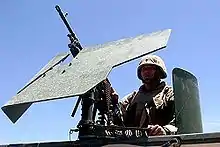Gun shield
A gun shield is a flat (or sometimes curved) piece of armor designed to be mounted on a crew-served weapon such as a machine gun or artillery piece, or, more rarely, to be used with an assault rifle.

Military
Some mounted machine guns and artillery pieces are equipped with metal armor plates to protect the gunners from sniper fire and shrapnel from explosions. They were fitted to some armored fighting vehicles and patrol boats during the Vietnam War.
_Driver_and_Commander_from_A_Squadron%252C_3rd_Cavalry_Regiment.jpg.webp)
Gun shields fell out of widespread use after the Vietnam war, but they have seen a resurgence in popularity during the 1990s. Israeli military analysts began urging the use of gun shields, pointing to the grave risk to soldiers exposed to fire from automatic weapons. In particular, it was noted that many casualties were hit in areas not protected by body armor or a helmet, such as the neck or face.
The U.S. began using gun shields during the 2000s-era wars in Iraq and Afghanistan. The major drawback of gun shields is that they limit the visibility of the user to the front, though new designs such as the Transparent Armor Gun Shield (TAGS for short) will alleviate this without sacrificing user protection.
Gun-shield from the armoury of Henry VIII
There are 46 surviving examples originally from the armoury of Henry VIII at the Palace of Westminster, the Tower of London and other Royal sites. Eight gun-shields have been found on the wreck of the Mary Rose. They have been thought to be Italian in origin, as they were offered to Henry VIII in a letter of 1544 from a painter of Ravenna named Giovanbattista. There are two distinct types of gun-shield: one of Italian manufacture and one an English version of heavier construction. There is evidence to suggest that the English gun-shields were converted from plain targets. At least two unconverted examples have been located.[1]
See also
- Ballistic shield
- Transparent Armor Gun Shield
- Gun mantlet
- Hillbilly armor
- Apilan and kota mara, gunshield and bulwark on Malay ships